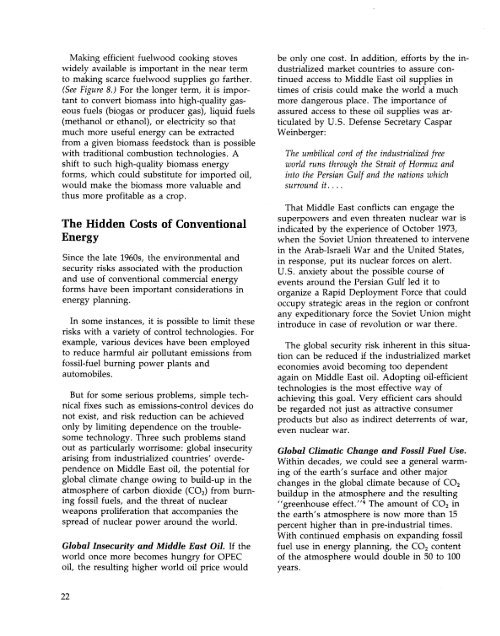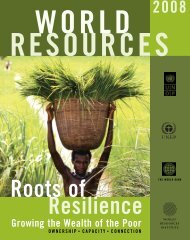ENERGY FOR A SUSTAINABLE WORLD - World Resources Institute
ENERGY FOR A SUSTAINABLE WORLD - World Resources Institute
ENERGY FOR A SUSTAINABLE WORLD - World Resources Institute
Create successful ePaper yourself
Turn your PDF publications into a flip-book with our unique Google optimized e-Paper software.
Making efficient fuelwood cooking stoves<br />
widely available is important in the near term<br />
to making scarce fuelwood supplies go farther.<br />
(See Figure 8.) For the longer term, it is important<br />
to convert biomass into high-quality gaseous<br />
fuels (biogas or producer gas), liquid fuels<br />
(methanol or ethanol), or electricity so that<br />
much more useful energy can be extracted<br />
from a given biomass feedstock than is possible<br />
with traditional combustion technologies. A<br />
shift to such high-quality biomass energy<br />
forms, which could substitute for imported oil,<br />
would make the biomass more valuable and<br />
thus more profitable as a crop.<br />
The Hidden Costs of Conventional<br />
Energy<br />
Since the late 1960s, the environmental and<br />
security risks associated with the production<br />
and use of conventional commercial energy<br />
forms have been important considerations in<br />
energy planning.<br />
In some instances, it is possible to limit these<br />
risks with a variety of control technologies. For<br />
example, various devices have been employed<br />
to reduce harmful air pollutant emissions from<br />
fossil-fuel burning power plants and<br />
automobiles.<br />
But for some serious problems, simple technical<br />
fixes such as emissions-control devices do<br />
not exist, and risk reduction can be achieved<br />
only by limiting dependence on the troublesome<br />
technology. Three such problems stand<br />
out as particularly worrisome: global insecurity<br />
arising from industrialized countries' overdependence<br />
on Middle East oil, the potential for<br />
global climate change owing to build-up in the<br />
atmosphere of carbon dioxide (CO 2 ) from burning<br />
fossil fuels, and the threat of nuclear<br />
weapons proliferation that accompanies the<br />
spread of nuclear power around the world.<br />
Global Insecurity and Middle East Oil. If the<br />
world once more becomes hungry for OPEC<br />
oil, the resulting higher world oil price would<br />
be only one cost. In addition, efforts by the industrialized<br />
market countries to assure continued<br />
access to Middle East oil supplies in<br />
times of crisis could make the world a much<br />
more dangerous place. The importance of<br />
assured access to these oil supplies was articulated<br />
by U.S. Defense Secretary Caspar<br />
Weinberger:<br />
The umbilical cord of the industrialized free<br />
world runs through the Strait of Hormuz and<br />
into the Persian Gulf and the nations which<br />
surround it. ...<br />
That Middle East conflicts can engage the<br />
superpowers and even threaten nuclear war is<br />
indicated by the experience of October 1973,<br />
when the Soviet Union threatened to intervene<br />
in the Arab-Israeli War and the United States,<br />
in response, put its nuclear forces on alert.<br />
U.S. anxiety about the possible course of<br />
events around the Persian Gulf led it to<br />
organize a Rapid Deployment Force that could<br />
occupy strategic areas in the region or confront<br />
any expeditionary force the Soviet Union might<br />
introduce in case of revolution or war there.<br />
The global security risk inherent in this situation<br />
can be reduced if the industrialized market<br />
economies avoid becoming too dependent<br />
again on Middle East oil. Adopting oil-efficient<br />
technologies is the most effective way of<br />
achieving this goal. Very efficient cars should<br />
be regarded not just as attractive consumer<br />
products but also as indirect deterrents of war,<br />
even nuclear war.<br />
Global Climatic Change and Fossil Fuel Use.<br />
Within decades, we could see a general warming<br />
of the earth's surface and other major<br />
changes in the global climate because of CO 2<br />
buildup in the atmosphere and the resulting<br />
"greenhouse effect." 9 The amount of CO 2 in<br />
the earth's atmosphere is now more than 15<br />
percent higher than in pre-industrial times.<br />
With continued emphasis on expanding fossil<br />
fuel use in energy planning, the CO 2 content<br />
of the atmosphere would double in 50 to 100<br />
years.<br />
22

















